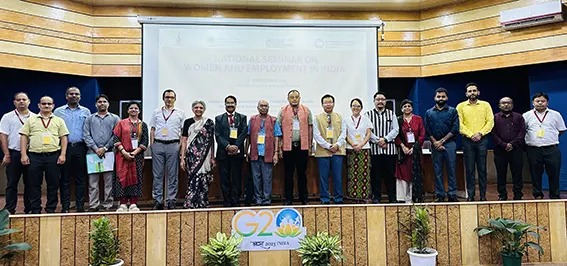RONO HILLS, 4 Sep: A three-day national seminar titled ‘Women and employment in India’, organised by the Centre for Development Studies of the economics department of Rajiv Gandhi University (RGU), in collaboration with New Delhi-based Institute of Human Development’s (IHD) Centre for Gender Studies (CGS), began here on Tuesday.
The seminar is aimed at having detailed deliberations on multifaceted issues relating to women’s employment, while also attempting to provide strategies and policies aimed at enhancing access to more employment opportunities and improving the quality of work.
Speaking during the inaugural session, RGU VC Prof Saket Kushwaha emphasised the significant influence of cultural norms and attitudes on women’s employment.
“Contribution of women should not be calculated merely on linear proportions of works they perform in offices daily; rather, it should be calculated covering all other daily chores they do for the upkeep of their families, homes and society as a whole,” he said, and called for “comprehensive policies to increase women’s access to better jobs in the organised sectors.”
Indian Council of Social Science Research (ICSSR) Member Secretary Prof Dhananjay Singh, who also attended the seminar, urged the researchers to “investigate aspects beyond the visible work that women are engaged in,” and said that “the society should also consider the other roles women play in their households.”
He informed that the ICSSR is encouraging research on gender issues, including women’s work.
IHD Director Prof Alakh N Sharma, along with Prof Balwant Mehta, presented the seminar’s background paper titled ‘Women’s employment in India: Emerging issues, challenges, and opportunities’. Prof Sharma said that, “significantly increasing women’s labour force participation is critical,” and informed that the recent increase in women’s participation “has been primarily in agriculture and self-employment, with a large share of unpaid family workers.”
“Despite primarily focusing on subsistence activities, the rise in worker participation is a positive development,” he added, and emphasised that India needs to have an integrated, proactive policy for women’s work, “which should include increasing the quality of employment and creating more employment opportunities for educated women.”
RGU Registrar Dr NT Rikam said that “adequate recognition and inclusion of women’s work is necessary,” and expressed hope that the seminar’s deliberations and proceedings would help to formulate more effective policies.
Among others, IHD CGS Chairperson Prof Aasha Kapur Mehta, RGU Prof Elizabeth Hangsing, and its Social Science Dean (i/c) Prof Vandana Upadhyay also spoke.
Thirty-five leading experts in the field from prominent institutions across the country, including RGU, JNU, Ambedkar University, Jadavpur University, Calcutta University, IHD, Punjabi University, NCERT, Mysuru, TISS Mumbai, University of Hyderabad, Jindal Global University, Mumbai University, Allahabad University, and Ahmedabad University, among others, as well as researchers from colleges across Arunachal Pradesh are taking part in the seminar.
Among others, RGU Agricultural Sciences Dean Dr Sandeep Janghu, Joint Registrar Dr David Pertin, Botany HoD Prof Sumpam Tangjang, Psychology HoD Dr Proshanto Kumar Saha, and Food Technology HoD Dr Deependra Rajoria were present at the inaugural session of the seminar.




